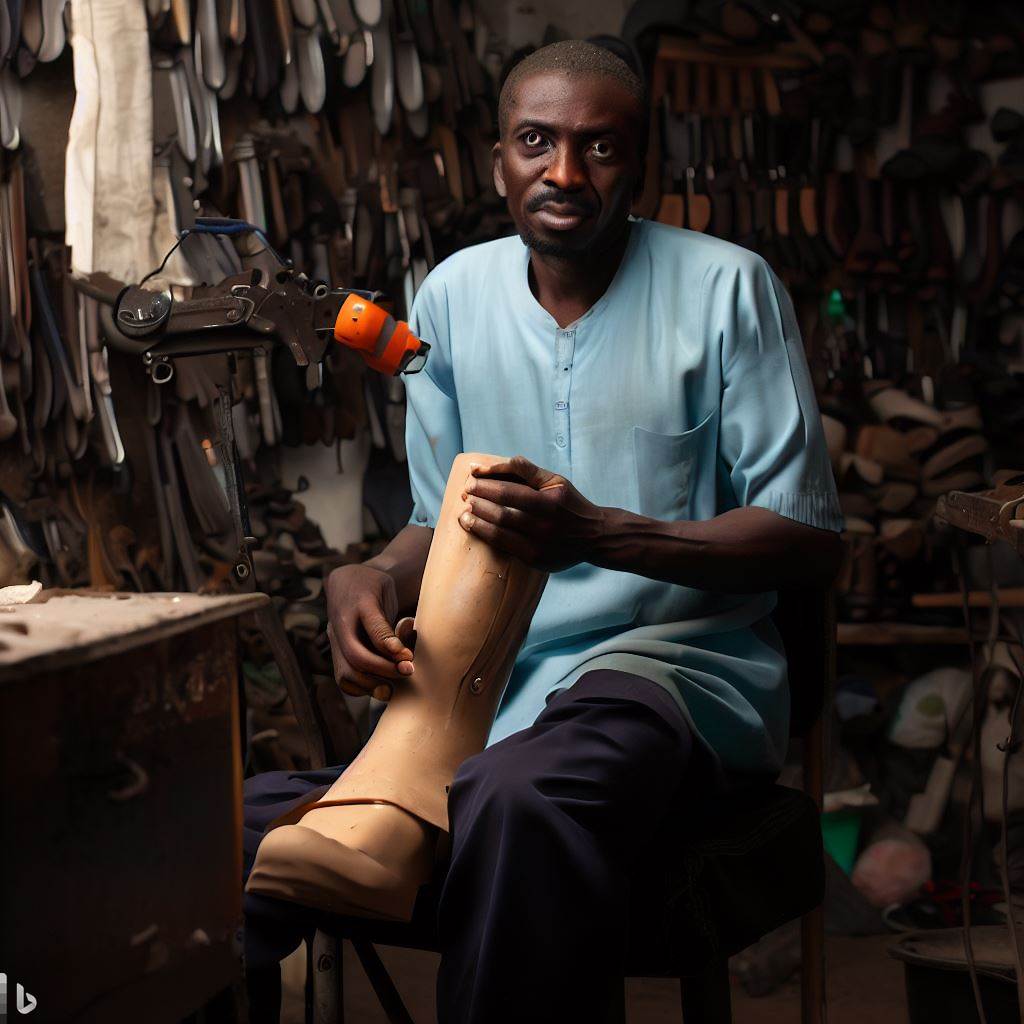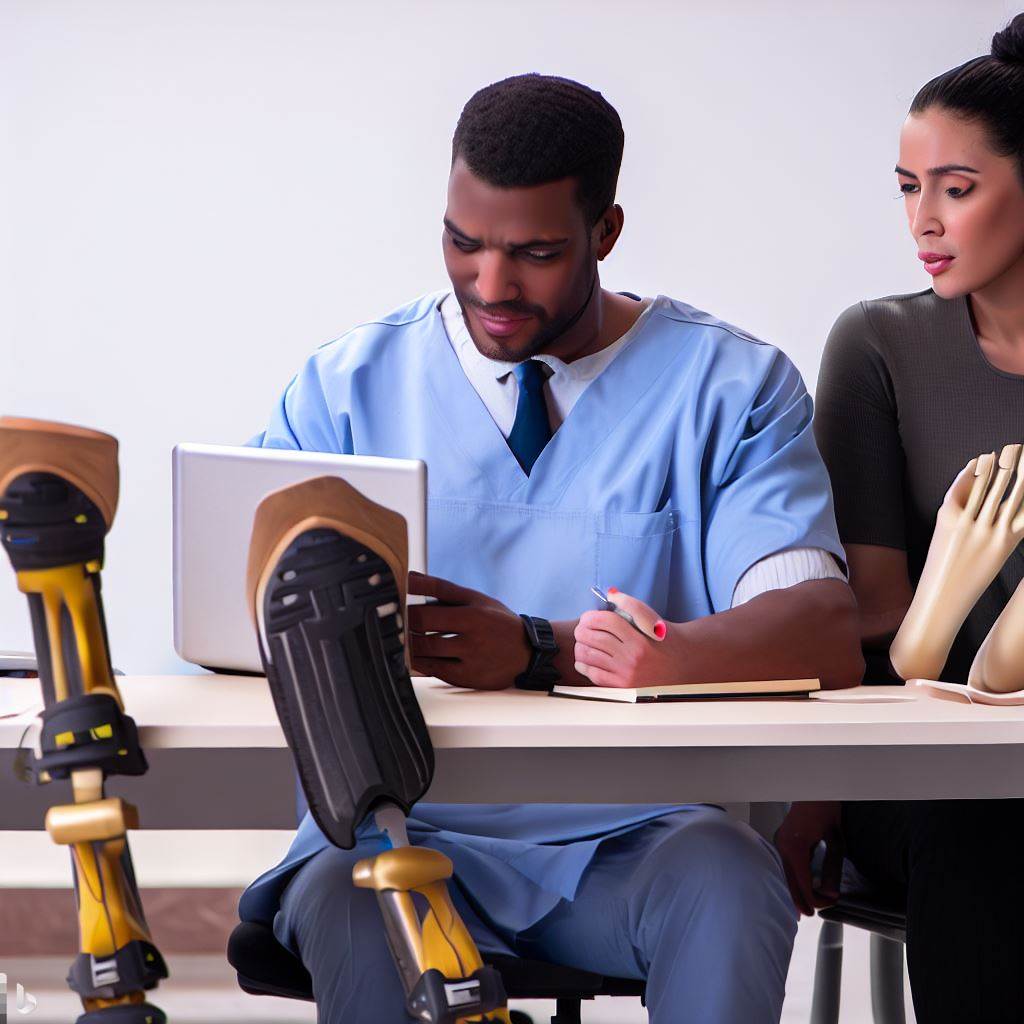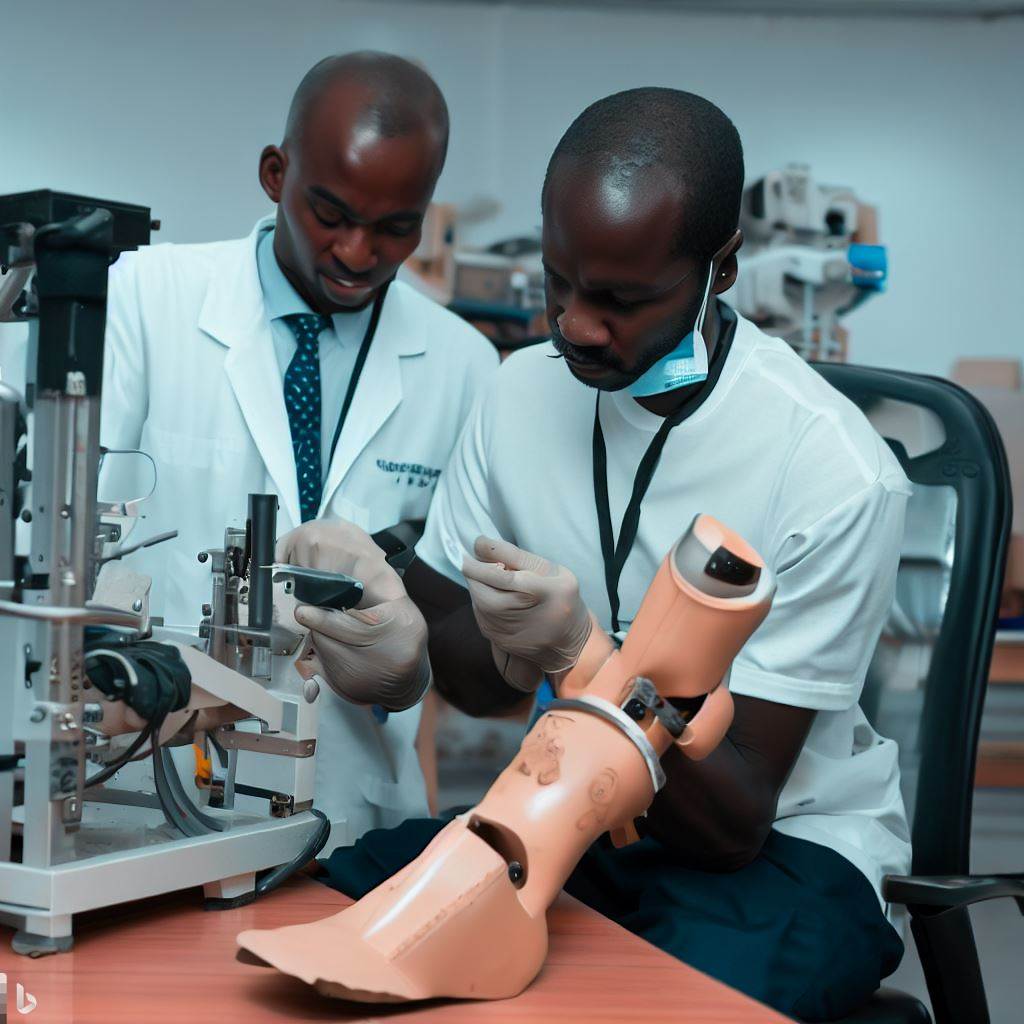Introduction
Orthotists/Prosthetists play a vital role in Nigeria, providing devices like braces and artificial limbs to patients, thereby improving the quality of life for those with physical disabilities.
In this blog post, we will delve into the life of these healthcare professionals and the significant impact they have on society.
An Orthotist/Prosthetist in Nigeria is a specialist who focuses on creating and fitting medical devices, such as orthoses and prostheses, to assist individuals with mobility challenges.
Their crucial role involves assessing patients’ needs, designing personalized devices, and ensuring the proper fitting and functionality of these aids.
In a country with diverse healthcare challenges, orthotists/prosthetists face unique obstacles. Limited access to resources and specialized training can pose difficulties in meeting the high demand for their services.
However, despite these challenges, these professionals remain dedicated to transforming lives and enabling individuals with physical disabilities to lead more fulfilling lives.
In short, understanding the significance of Orthotists/Prosthetists in Nigeria sheds light on the invaluable contributions they make, enhancing the lives of countless individuals and promoting inclusivity in society.
Education and Training
Educational requirements to become an Orthotist/Prosthetist in Nigeria
To become an Orthotist/Prosthetist in Nigeria, several educational requirements must be met. These include:
- Obtaining a Bachelor’s degree: Aspiring Orthotists/Prosthetists must complete a Bachelor’s degree program in Orthotics and Prosthetics or a related field.
- Core coursework: The educational curriculum usually includes courses such as Anatomy, Physiology, Biomechanics, Prosthetic Design, Orthotic Fabrication, and Patient Management.
- Clinical experience: Practical training, often in the form of clinical rotations, is an essential component of the educational process. This allows students to gain hands-on experience in working with patients.
Training and certification process
Once the educational requirements are fulfilled, the training and certification process for Orthotists/Prosthetists in Nigeria involves the following steps:
- Internship or residency: After completing their Bachelor’s degree, graduates must undergo a mandatory one-year internship or residency program in an accredited Orthotics and Prosthetics facility.
- Certification examination: To practice as a qualified Orthotist/Prosthetist in Nigeria, individuals must pass the certification examination conducted by the Orthotics and Prosthetics Association of Nigeria (OPAN).
- Continuing professional development: Continuous learning and professional development are crucial for Orthotists/Prosthetists to stay updated with advances in their field. They must actively participate in workshops, seminars, and conferences.
Importance of continuous professional development
The importance of continuous professional development for Orthotists/Prosthetists cannot be overstated.
It enables them to:
- Enhance clinical skills: Continuing education allows Orthotists/Prosthetists to learn new techniques, technologies, and treatment options to provide the best care for their patients.
- Stay updated with industry trends: The field of Orthotics and Prosthetics is constantly evolving. By engaging in professional development activities, Orthotists/Prosthetists can stay abreast of the latest trends and advancements in their field.
- Collaborate and network: Professional development opportunities provide platforms for Orthotists/Prosthetists to meet and collaborate with colleagues from different regions and expertise areas. This fosters a supportive professional community.
- Improve patient outcomes: By pursuing continuous professional development, Orthotists/Prosthetists can improve their ability to assess and meet the unique needs of their patients, resulting in better treatment outcomes.
In review, becoming an Orthotist/Prosthetist in Nigeria requires meeting specific educational requirements, completing mandatory training, passing certification exams, and actively engaging in continuous professional development.
These processes ensure that Orthotists/Prosthetists are equipped with the knowledge and skills necessary to provide quality care to their patients.
Career Overview
An orthotist/prosthetist is a healthcare professional who specializes in the design, fabrication, and fitting of orthopedic braces (orthotics) and artificial limbs (prosthetics).
They work closely with patients to assess their needs, create customized devices, and provide ongoing support and follow-up care.
Daily Tasks and Responsibilities
- Evaluate patients’ condition and medical history to determine the best orthotic/prosthetic solution.
- Take measurements and create molds to ensure proper fit and function of devices.
- Design and fabricate orthotics or prosthetics using specialized materials and tools.
- Fit and adjust devices to ensure optimal comfort and functionality for patients.
- Provide education and instructions on how to use and care for orthotic/prosthetic devices.
- Maintain detailed patient records and documentation of treatment plans and progress.
- Collaborate with physicians, physical therapists, and other healthcare professionals to develop comprehensive treatment plans.
- Stay up to date with advancements in orthotics/prosthetics technology and techniques.
- Attend conferences and participate in professional development activities to enhance knowledge and skills.
Work Settings
An orthotist/prosthetist can work in various settings, including:
- Hospitals: They collaborate with orthopedic surgeons and other professionals to provide specialized care to patients.
- Private Practices: They may work in their own practice or as part of a team providing orthotic/prosthetic services.
- Rehabilitation Centers: They assist patients in their rehabilitation journey by designing and fitting appropriate devices.
- Prosthetic Manufacturing Companies: They contribute to the development and production of advanced prosthetic technologies.
- Government Health Institutions: They support the healthcare system by providing orthotic/prosthetic services to the public.
Importance of Teamwork and Collaboration
Orthotist/prosthetists understand the significance of teamwork and collaboration with other healthcare professionals.
By working together, they can provide the best possible care to their patients. Collaboration allows for:
- Comprehensive Treatment: By communicating and sharing information, healthcare professionals can develop holistic treatment plans that address all aspects of a patient’s condition.
- Better Outcomes: Collaborative efforts lead to more efficient and effective treatments, resulting in improved patient outcomes and satisfaction.
- Enhanced Expertise: Each healthcare professional brings unique skills and knowledge to the table, contributing to a collective pool of expertise.
- Continuity of Care: Collaboration ensures seamless transitions between different stages of care, promoting a patient-centric approach throughout the treatment process.
- Professional Growth: By working alongside other professionals, orthotist/prosthetists can learn from their peers and expand their knowledge and skills.
Overall, the life of an orthotist/prosthetist in Nigeria is a rewarding career that involves providing orthotic and prosthetic solutions to patients in need.
Their daily tasks include evaluation, design, fabrication, fitting, and ongoing support.
They work in various settings, relying on teamwork and collaboration with other healthcare professionals to deliver optimal care.
Read: Key Skills Every Nigerian Nursing Assistant Must Have

Challenges and Rewards
The life of an Orthotist/Prosthetist in Nigeria is a challenging yet rewarding journey.
Facing the hurdles of limited resources and funding, these professionals strive to provide essential care to their patients.
The scarcity of equipment, materials, and specialized prosthetic components makes it difficult to deliver optimal prosthetic devices and orthotic supports.
The lack of funding in Nigeria’s healthcare system further compounds the challenges, making it challenging to cater to patients who cannot afford private healthcare services.
Despite these difficulties, Orthotists/Prosthetists find fulfillment in their profession through the positive impact they create.
The opportunity to enhance the quality of life for patients stands as one of the most rewarding aspects of their job.
Crafting custom-made prosthetic limbs and orthotic devices enables these professionals to help individuals regain their mobility and independence, fostering a sense of purpose and satisfaction.
Working closely with patients, Orthotists/Prosthetists assess their unique needs and fit them with appropriate devices.
Witnessing the transformative effect of these devices on patients’ lives brings immense satisfaction, as they witness firsthand the joy of restored abilities and newfound hope.
Therefore, the life of an Orthotist/Prosthetist in Nigeria comes with significant obstacles in the form of limited resources and funding.
However, the profession offers immense rewards through the chance to improve the lives of patients, help them regain independence, and leave a lasting positive impact on their well-being.
It is a journey of dedication, compassion, and the pursuit of making a difference in the lives of those they serve.
Read: The Day-to-Day Life of a Nursing Assistant in Nigeria
Professional Associations and Networking
Professional associations play a crucial role in the field of Orthotics/Prosthetics in Nigeria.
These organizations provide support, resources, and networking opportunities for Orthotists/Prosthetists to enhance their professional growth and development.
In this section, we will discuss the professional associations available in Nigeria and the benefits of joining them.
Nigerian Society of Orthotists/Prosthetists (NSOP)
The NSOP is the primary professional association for Orthotists/Prosthetists in Nigeria. It serves as a platform for professionals to interact, share knowledge, and collaborate for the advancement of the field.
Joining NSOP provides access to a wide range of resources, including research papers, case studies, and industry news.
Read: The Role of Exercise Physiology in Nigeria’s Sports Industry
West African Orthotic/Prosthetic Association (WAOA)
WAOA is an organization that brings together professionals from the West African region.
It promotes cooperation, knowledge exchange, and standardization of practice in Orthotics/Prosthetics.
Membership in WAOA opens the door to networking opportunities with experts from neighboring countries.
International Society for Prosthetics and Orthotics (ISPO)
ISPO is a global professional association that aims to improve the quality of life for individuals with physical disabilities.
Orthotists/Prosthetists in Nigeria can benefit from joining ISPO by gaining access to international conferences, workshops, and research publications.
This association also offers certification programs for professionals seeking to enhance their credentials.
Benefits of Joining Professional Associations
Access to Resources
Being a member of these associations grants access to a vast pool of resources. This includes journals, articles, and textbooks that provide the latest research findings and innovations in Orthotics/Prosthetics.
Having access to such resources aids in staying updated with the advancements in the field.
Networking Opportunities
Professional associations provide a platform for Orthotists/Prosthetists to connect and network with fellow professionals.
These interactions allow for the exchange of ideas, experiences, and knowledge. Networking can lead to collaborations, mentorships, and job opportunities.
Professional Development Programs
Joining these associations provides access to various professional development programs. This includes workshops, seminars, and continuing education courses.
Participating in these programs allows Orthotists/Prosthetists to enhance their skills, stay updated with best practices, and maintain professional competence.
Staying Updated with Advancements
Attending conferences and workshops is crucial for Orthotists/Prosthetists to stay informed about the latest advancements in the field.
Conferences provide a platform to learn from industry experts, engage in discussions, and present research findings. Workshops offer hands-on training on emerging techniques and technologies.
In essence, professional associations and networking play a vital role in the life of an Orthotist/Prosthetist in Nigeria.
Joining associations like NSOP, WAOA, and ISPO provides access to resources, networking opportunities, and professional development programs.
Additionally, attending conferences and workshops helps in staying updated with the latest advancements in the field.
By actively engaging with these associations, Orthotists/Prosthetists can contribute to the growth and development of Orthotics/Prosthetics in Nigeria.
Read: Orthotist and Prosthetist Training: Nigeria’s Pathway
Future Outlook
The future prospects for Orthotists/Prosthetists in Nigeria are promising, offering exciting growth opportunities in the evolving healthcare field.
The demand for their services is expected to rise significantly due to two key factors. Firstly, the aging population contributes to the increasing demand for Orthotists/Prosthetists.
With people living longer, age-related conditions such as osteoarthritis and stroke are on the rise, necessitating orthotic or prosthetic interventions to enhance mobility and quality of life.
Secondly, the prevalence of chronic diseases like diabetes, vascular disease, and cancer is increasing in Nigeria, leading to a greater need for prosthetic or orthotic solutions.
As these conditions become more common, the demand for skilled professionals in this field will continue to grow.
Moreover, advancements in technology and techniques play a vital role in shaping the future of Orthotists/Prosthetists in Nigeria.
Ongoing research and development have led to innovations in materials and design, resulting in improved patient outcomes and greater mobility.
An area with great potential for growth is 3D-printed prosthetics.
This technology enables customized and cost-effective solutions, especially for children who outgrow traditional prosthetic limbs.
Additionally, integrating smart technology into orthotic and prosthetic devices enhances their functionality and usability, thereby improving the quality of life for individuals relying on these devices.
For Orthotists/Prosthetists in Nigeria, staying updated on the latest developments through continuing education and professional development is essential.
By dedicating themselves to ongoing learning and improving patient outcomes, these professionals can make significant contributions to the healthcare landscape in Nigeria.
In a nutshell, the life of an Orthotist/Prosthetist in Nigeria holds promising opportunities.
The growing demand for their services, coupled with technological advancements, paves the way for a rewarding and impactful career in this vital healthcare field.
Read: How to Become a Medical Lab Technician in Nigeria
See Related Content: Nigeria’s Paramedic Shortage: Causes and Solutions
Conclusion
This blog post delves into the life of an Orthotist/Prosthetist in Nigeria, highlighting their crucial role in improving the lives of people with physical disabilities.
These professionals are instrumental in providing mobility and independence to those in need, emphasizing their significance in society.
Becoming an Orthotist/Prosthetist is a rewarding and fulfilling career option.
By choosing this path, individuals can make a meaningful impact on the lives of others and contribute to society’s betterment.
Consider the difference one can make by dedicating themselves to this profession.
Most importantly, the life of an Orthotist/Prosthetist in Nigeria revolves around positively transforming the lives of individuals with physical disabilities.
Their dedication to enhancing mobility and independence is essential, making them invaluable members of society.
Embarking on this career journey offers the chance to create a lasting, positive change in people’s lives.




